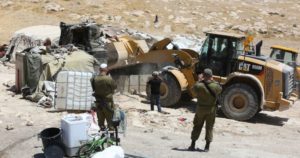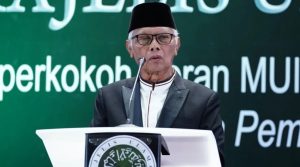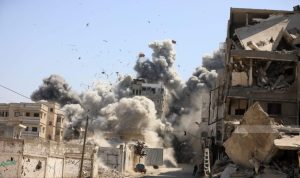by Alaa Tartir*

In the wake of the Israeli elections and the financial crisis of the Palestinian Authority, observers wonder about the dangers of a new Palestinian Intifada and the detrimental consequences for Israeli security and regional stability of dismantling the PA. (Photo: Ma’an)
In the wake of the Israeli elections and the financial crisis of the Palestinian Authority, observers wonder about the dangers of a new Palestinian Intifada and the detrimental consequences for Israeli security and regional stability of dismantling the PA.
Furthermore, observers struggle to understand and imagine how a termination or suspension of security collaboration between the PA and Israel, or a potential collapse or dismantling of the PA would have any benefit for the Palestinian people.
Presented below are several explanations that address this confusion, and it is argued here that such developments would alter the imbalance of power, expose the international community and the aid industry, force Israel to deal with the costs of its occupation, and allow the Palestinians to re-set their priorities and agenda, while possibly reinventing their political system.
Also Read: The Forty-Four-Days of Glory: Azerbaijan’s Struggle for Justice and Peace
Discontinuing security collaboration and reinventing the duties of the PA as a self-governing body of the Palestinians in West Bank and Gaza are crucial to addressing the power imbalances between the occupied and the occupier. Unless a fundamental shift occurs in the power relations amongst the various actors, there is little hope for genuine peace or security.
To change the power dynamics, Palestinians have multiple strategies and tools at their disposal to realize their self-determination, including different forms of resistance, the civil-society led boycott, divestment and sanctions campaign, and resort to the International Criminal Court to hold war criminals accountable. It is a rational decision to use international law to address oppression and injustice.
Re-inventing the PA’s security doctrine and stopping security collaboration with Israel will provide better security to the Palestinian people and respond to their demands. According to a recent poll, 80 percent of Palestinians opposed continued security coordination with Israel. This will also ease the alarming Palestinian authoritarian transformation and the formation of a police state.
n 2012, the Arab Organization for Human Rights in UK reported that between 2007 and 2011, the PA security forces “detained 13,271 Palestinian citizens, 96 percent of whom were subjected to various methods of torture.” In 2013, the Euro-Med Observer for Human Rights reported that the Palestinian security forces in the West Bank arbitrarily arrested 723 persons and interrogated 1,137 without any clear charge or a court decision of arrest. Similar numbers were reported by the Independent Commission on Human Rights; it received 3,185 complaints on human rights violations in 2012, compared to 2,876 complaints in 2011, and 3,828 complaints in 2010.
Also Read: Palestine Solidarity Month: A Collective Movement for Al-Aqsa and Palestine’s Freedom
And therefore, security sector reform that was perceived by the different authorities as a pre-requisite for the Palestinian state-building project, resulted in increasing authoritarian trends, criminalizing resistance — in its broader meaning as a way of living — against the Israeli occupation, and entrenched the Israeli occupation directly and indirectly.
A reversal of these trends will provide better security for the Palestinian people, and will bridge the internal legitimacy crisis that the Palestinian leadership has faced for decades.
Threatening to dissolve the PA will also expose the international community and put them under the spotlight to act. The PA remains a product created by the international community, and not by the Palestinian people.
The collapse of the PA would also reveal the real story of the Israeli settler-colonial military occupation, instead of continuing to mask the reality with glowing rhetoric regarding the state-building project. Therefore, the international donor community will be forced to deal with a new reality and fundamentally question their “investment” in building a Palestinian state under a foreign military occupation.
Also Read: Hassan al-Turabi: A Controversial Thinker from Sudan
It is an opportunity to re-evaluate the effectiveness of the $24 billion of aid provided to the Palestinians since the Oslo Peace Accords, and establish a new framework for the aid industry that first and foremost holds donors accountable and puts the Palestinians in the driver’s seat in their own development process.
In turn, this will push Israel and the Israeli people/settlers to realize that the occupation of Palestinian land is very costly. In the absence of international payers, and with the emergence of new players, Israel will also be forced to deal with a new reality; this time without having the externally-sponsored PA sub-contractor to govern or repress part of the Palestinian people.
The new reality would also mean that Palestinians could finally set different priorities for their struggle and national movement, and start re-framing their political program and strategies for liberation.
The priorities set by Israel’s security-driven framework for the Oslo Accords 20 years ago are well beyond obsolete thanks to the realities on the ground created by the Israeli occupation. This is not to argue that the collapse of the PA or the discontinuity of security collaboration will automatically lead to better results; indeed the process of change will be full of obstacles, challenges and uncertainties.
Also Read: Who Exactly is the RSF Group Shaking Sudan?
Instead, it is to argue that if changed realities are pushed by a legitimate and accountable Palestinian leadership, it could create major transformations in people’s lives and carry positive implications for the trajectory of the Palestinian-Israeli conflict.
To be clear, the current Palestinian leadership is neither capable nor interested in making these fundamental shifts. However, a new trajectory could lead to a break-through in the structure of the Palestinian political system, with positive ramifications on the lives of the Palestinian people.
The above-mentioned explanations do not exist in a vacuum. The shifts and transformations that could take place in the aftermath of the PA collapse or ending the security collaboration will influence the overall adopted framework for the two-state solution. After decades of this failing paradigm, this will be another opportunity for the Palestinian people to address the existing imbalance of power and it could be a catalyst for a new framing of the Palestinian struggle for freedom and self-determination.
Instead of viewing the potential collapse or dismantling of the PA and its security forces as factors that put the whole region in chaos, the international community must seize the moment to abandon the “peace process party” and the “state-building mirage” to start tackling the real question: How we can put an immediate end to the Israeli military occupation? (T/P010/P3)
Also Read: The Two-State Solution (Palestine–Israel) in Historical Perspective
Mi’raj Islamic News Agency (MINA)
*Alaa Tartir is a Palestinian writer and researcher who is working on a PhD at the London School of Economics. He is also the program director of Al-Shabaka: The Palestinian Policy Network.
Source: http://www.maannews.com/eng/ViewDetails.aspx?ID=760016
Also Read: Enchanted by K-Dramas, Dragged into Slander: Time for Muslims to Rise!

































 Mina Indonesia
Mina Indonesia Mina Arabic
Mina Arabic